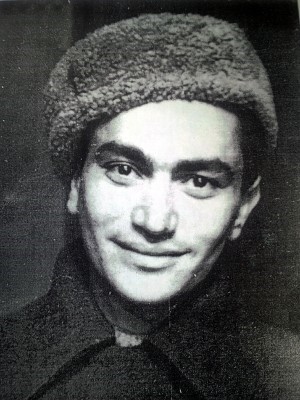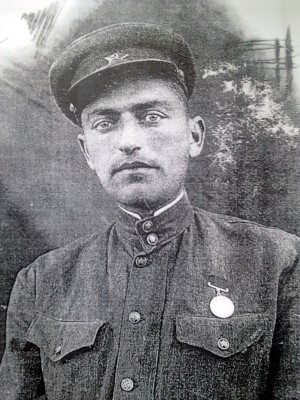Herts Rogovoi was born in 1924 in Kiev. His father Moisei Rogovoi was a senior salesman at a Shvartsman shop (before the Russian revolution, Isaak Shvartsman was the owner of a veritable empire of textile shops in Kiev and in other locations in Ukraine). The Rogovoi family was affluent. After the revolution, during the NEP (New Economic Policy, 1921-1928), Moisei had his own business and was temporarily acceptable to the regime as a NEPman, but in the late 1920s he was arrested and accused of failing to pay taxes. Consequently, he spent three years in a prison camp.
In June 1941, when the Soviet-German war began, Herts had completed only ninth grade. He was mobilized to dig trenches on the western outskirts of Kiev. While engaged in this work, Rogovoi experienced an enemy aircraft raid: a bomb exploded 15 meters from him and he was lightly shocked. Somewhat later, he was drafted for military work and evacuated eastward from Kiev. Rogovoi was transferred from place to place, before ending up in a military training camp in the Moscow Region. In October 1941, a rifle regiment was formed from cadets who had failed to complete their training and, in December 1941, they took part in battles near Moscow (on the Istra River), where Rogovoi was wounded.
After leaving the hospital, he was temporarily dismissed from the army for being underage. At that time he located his parents, who had succeeded in fleeing from Kiev and were living near Voronezh, in southern Russia. Rogovoi recalled that his father did not want to evacuate because he had no illusions concerning the Reds, while he favorably remembered the German occupation of Kiev in 1918, when the German Army had maintained peace in the city and did not permit pogroms. The father's eventual decision to leave Kiev had a personal motivation. He said to his wife: "What will we do in Kiev? Our elder son [Grigorii] is in the army, the younger one has also been drafted. Here there will probably be a separate state. So, should we live in one state [an independent Ukraine], and our children in another [in Russia]. We must go to live with our sons." So Herts' parents left Kiev, but the rest of the family did not and perished in Babii Iar.
Rogovoi was drafted into the Red Army for the second time in August 1942. Once more he found himself in a training camp, where the training, he later recalled, was unsatisfactory. In November 1942 he was deployed as a machine-gunner on the frontlines – in Stalingrad. That was at the time when Field Marshal Erich von Manstein, with his Heeresgruppe [Army Group] Don, was coming from the west to attempt to liberate Paulus's 6th Army from its encirclement in the ruined city. The mission of Rogovoi's 37th Rifle Division was to halt Manstein's advancement. It was at this point that Rogovoi was awarded the Order of the Red Banner from Lieutenant-General Vasilii Chuikov, the commander of the Soviet 62nd Army. Rogovoi was also promoted to the rank of second lieutenant and became a platoon commander.
In 1943, Rogovoi fought in the Oriol and Kursk Regions (in southern Russia). In March, he was seriously wounded ("I had five holes in my body" was the way he put it). Until December of that year he was treated in various military hospitals and, then, dismissed from the army as an invalid. By the end of the war, Rogovoi had been awarded three military orders and a number of Soviet medals, as well as a Polish medal, for his rescue of a Polish officer.
During his hospitalization Rogovoi decided to become a physician after the war. In 1944, he returned to Kiev, where graduated from a medical institute and then worked in internal medicine. Rogovoi retired in 1998. He was a member of the Kiev Society of Jewish War Veterans.
Herts' beloved elder brother Grigorii was drafted into the Red Army just days before the Soviet-German war began. He took part in the retreat) of 1941, narrowly escaping being captured by the Germans. In 1942 and 1943 he fought at Stalingrad, serving in the same division as Herts, without either one knowing this. Grirorii remained in military service until 1946. He died in 1978. Grigorii's children and grandchildren now live in Israel.
As mentioned above, Herts more distant relatives perished in Babii Yar, except for two cousins, who were killed in combat in Stalingrad. His cousin Nukhim (Nakhum) Gruzer was killed in the Kalmyk Steppes in November 1942. Nukhim's sister Liia was killed serving in an anti-aircraft unit in Orlovka, on the outskirts of Stalingrad.
(The biography above is based on an interview given by Herts Rogovoi in 2011)








